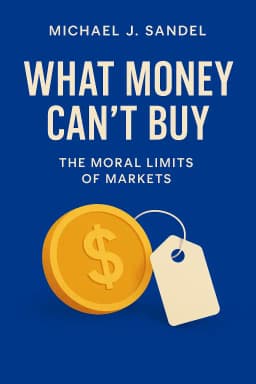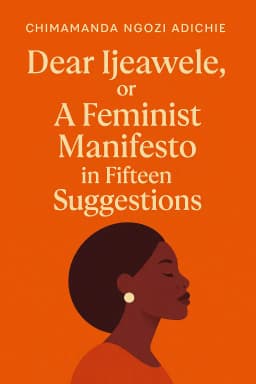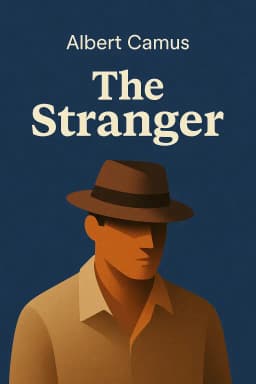
The Price of Everything?
The Moral Limits of Markets
Golden Hook & Introduction
SECTION
Michael: Kevin, did you know that for years, major companies from Walmart to big banks have been taking out life insurance policies on their rank-and-file employees—janitors, cashiers, you name it? Kevin: Wait, what? So the company gets a cash payout when their employee dies? That sounds… ghoulish. Why on earth would they do that? Michael: Exactly. In the industry, it's sometimes called 'dead peasant insurance.' And that's the perfect, if unsettling, entry point into the world we're exploring today. Kevin: That is deeply weird. It feels like a symptom of something larger, this sense that absolutely everything is becoming a financial product. Michael: You've nailed it. This all comes from Michael Sandel's incredible book, What Money Can’t Buy: The Moral Limits of Markets. And it's so important to know who Sandel is. He isn't just an economist; he's one of the world's most famous political philosophers from Harvard, known for making big ethical questions accessible. Kevin: Ah, so he's coming at this from a moral angle, not just a financial one. Michael: Precisely. He published this book in 2012, right in the shadow of the 2008 financial crisis, when a lot of people were looking around and asking, "Have we let markets run too wild? Have we put a price tag on things that shouldn't be for sale?" Kevin: A question I think we're still asking. So, beyond this creepy insurance, where else is this happening? Michael: Oh, it's everywhere. And it often starts with something that seems totally harmless: the simple act of jumping a queue.
The 'Skyboxification' of Life: Are We All Living in Different Worlds?
SECTION
Kevin: Okay, I can relate to that. I've definitely paid extra at an amusement park to get a fast pass and skip the two-hour line for a rollercoaster. It feels like a smart use of money. Michael: It feels smart, right? It feels efficient. But Sandel uses these examples to show how we're creating what he calls a 'skyboxification' of life. We used to share common experiences, like waiting in line. Now, those with money can buy their way into a completely different, faster, more comfortable reality. Kevin: The skybox at a stadium is a perfect analogy. The super-rich are in a glass box with catering, and everyone else is in the stands getting rained on. Michael: Exactly. And it goes to some pretty wild places. For instance, in Santa Ana, California, non-violent offenders can pay for a prison cell upgrade. For about $82 a night, you get a clean, quiet cell, away from the general population in the loud, crowded, non-paying section. Kevin: You're kidding. There's a VIP section in jail? That's insane. Justice is supposed to be blind, not have a preferred customer lane. Michael: That's the feeling it evokes. Or think about traffic. In many cities, they have what critics call 'Lexus Lanes.' These are express toll lanes where solo drivers can pay a fee—which changes with traffic—to bypass the gridlock. So you can be crawling along at 15 miles per hour in the free lanes, watching someone zip by at 65 because they could afford the ten-dollar toll. Kevin: Okay, but hold on. Let me play devil's advocate here. Isn't this just a market working perfectly? My time is valuable. If I'm willing to pay to save an hour, and someone else would rather save the ten bucks, isn't that a voluntary exchange that makes us both better off? What's the real harm? Michael: That is the classic economic argument, and Sandel takes it head-on. He says there are two big problems with it. The first is the fairness objection, which is pretty obvious. When everything is for sale, life gets a lot harder for people with modest means. Access to basic goods, public spaces, even a faster commute, becomes a luxury. It deepens inequality. Kevin: Right, the gap between the rich and everyone else becomes a physical reality you see on the highway every day. Michael: But the second objection is the one that's more profound and surprising. It's the corruption argument. Sandel argues that putting a price on certain things can corrupt them. It changes their meaning. Turning a public highway into a two-tiered system erodes the sense that we're all in this together. The line at the amusement park was once a great equalizer; kids from all backgrounds waited together. When you replace that with a market, you lose that shared civic experience. Kevin: So it's not just about the distribution of goods, it's about the attitudes and norms that the market promotes. You're not just buying a faster ride; you're buying your way out of a shared social space. Michael: You are. You're opting out of the common life. And that's a small thing in an amusement park, but when you apply that logic to healthcare, education, and even Congress—where lobbyists hire homeless people to stand in line for them to get into hearings—you start to see the corrosive effect. Kevin: The line-standing for lobbyists is wild. It's literally the commodification of democratic access. Wow. Okay, so the fairness part I get. But this corruption idea… that putting a price on something can actually spoil it… that feels like the real heart of the matter. Michael: It is. And that's where Sandel's argument gets really fascinating, because he shows that sometimes, introducing money doesn't just change the experience—it can backfire completely.
The Corruption Argument: How a Price Tag Can Spoil the Goods
SECTION
Kevin: What do you mean, backfire? Money is the ultimate motivator, right? If you want someone to do something, you pay them. More money, more motivation. Michael: That's what standard economics teaches us. But Sandel presents this incredible real-world experiment that turns that idea on its head. It happened in Switzerland in the 1990s. The country was trying to find a place to store radioactive nuclear waste. As you can imagine, nobody wanted it in their backyard. Kevin: Yeah, "Not In My Backyard." NIMBYism. I can't imagine a tougher sell. Michael: Exactly. So they identified a small mountain village called Wolfenschiessen as a potential site. Shortly before a referendum, some economists went in and surveyed the residents. They asked them a simple question: "If the Swiss parliament decides to build the repository here, would you vote to accept it?" It was framed as a question of civic duty—we all need electricity, so we all have a responsibility to deal with the waste. Kevin: And what did they say? Michael: A surprising 51% of the villagers said yes. They were willing to accept it out of a sense of public responsibility, even with the risks. Kevin: Wow, that's a pretty public-spirited village. So where's the twist? Michael: Here it is. The economists then went back to the same villagers and asked a slightly different question. "Suppose parliament proposed building the facility here, and offered to compensate each resident with a substantial annual monetary payment. Then would you favor it?" Kevin: Okay, so now they're getting paid for it. The support must have shot up, right? Maybe to 70 or 80 percent? Michael: The opposite happened. Support for hosting the nuclear waste site plummeted. It was cut in half, down to just 25%. Kevin: Whoa, hold on. You offer them money and fewer people agree? That makes no sense. Why would that happen? My brain just broke. Michael: This is the core of Sandel's corruption argument. The money didn't add to their sense of civic duty; it replaced it. The first question was a moral one: "What is our duty as citizens?" The second question, with the cash offer, turned it into a financial one: "Is the pay worth the risk and the burden?" Kevin: Ah, I see. It crowded out their better instincts. The offer of cash was almost an insult. It reframed their civic sacrifice as a dirty, dangerous job for hire. Michael: Precisely. The financial incentive corroded the norm of civic duty. And once that norm is gone, it's very hard to get back. This is what Sandel means by "crowding out." Market values—the logic of a transaction—can push aside non-market values like altruism, generosity, and civic spirit. Kevin: That’s a powerful idea. It’s like with gift-giving. An economist might say the most efficient gift is cash, because the person can buy exactly what they want. But giving cash for a birthday can feel cold and impersonal. The whole point of a gift is the thought, the effort, the expression of a relationship—things a price tag dissolves. Michael: That's a perfect example. Or think about paying kids for good grades. A school in Dallas started paying second-graders two dollars for every book they read. Kevin: Did it work? Michael: In the short term, maybe. But what's the long-term lesson? It risks teaching kids that reading isn't an activity that's intrinsically rewarding, but a chore you do for pay. The bribe can extinguish the very love of learning you're trying to foster. The price corrupts the good. Kevin: So the danger isn't just that we're creating a world where the rich and poor live separately. The deeper danger is that we're creating a world where we've forgotten how to value things without a price tag. We're losing the language of morality and civic life. Michael: That is the ultimate warning in Sandel's book. He says we've drifted from having a market economy to being a market society. And the difference is profound.
Synthesis & Takeaways
SECTION
Kevin: So when you put it all together, it's a one-two punch. First, the 'skyboxification' of life creates these visible divides and resentments. Michael: Yes, the fairness problem. It's immediately obvious and easy to get angry about. Kevin: But then there's this quieter, more insidious problem—the corruption argument. The very act of putting things up for sale, even if the price is fair, changes us. It changes our relationship to each other and to the things we ought to value. Michael: Exactly. So we see this progression. It starts with paying to jump a line, which seems harmless. But that same logic leads to a world where we might consider selling citizenship, or trading pollution credits, or creating markets in human life. It replaces civic duty with a cost-benefit analysis, and altruism with a transaction. It empties public life of its moral substance. Kevin: It really makes you stop and think. What are the things in my own life—friendship, family, community—that would be completely ruined if they had a price tag? What are the things we as a society should just agree are not for sale? Michael: That's the exact public debate Sandel wanted to start with this book. It's not an anti-market screed; it's a call for a moral conversation. He's asking us to consciously decide where markets serve the public good, and where they don't belong. Kevin: A conversation that feels more urgent now than ever. Michael: Absolutely. And we'd love to hear what our listeners think. What's something you believe money should never, ever be able to buy? Let us know on our social channels. We're genuinely curious to see where you draw the line. Kevin: It’s a question worth asking ourselves and each other. Michael: This is Aibrary, signing off.









